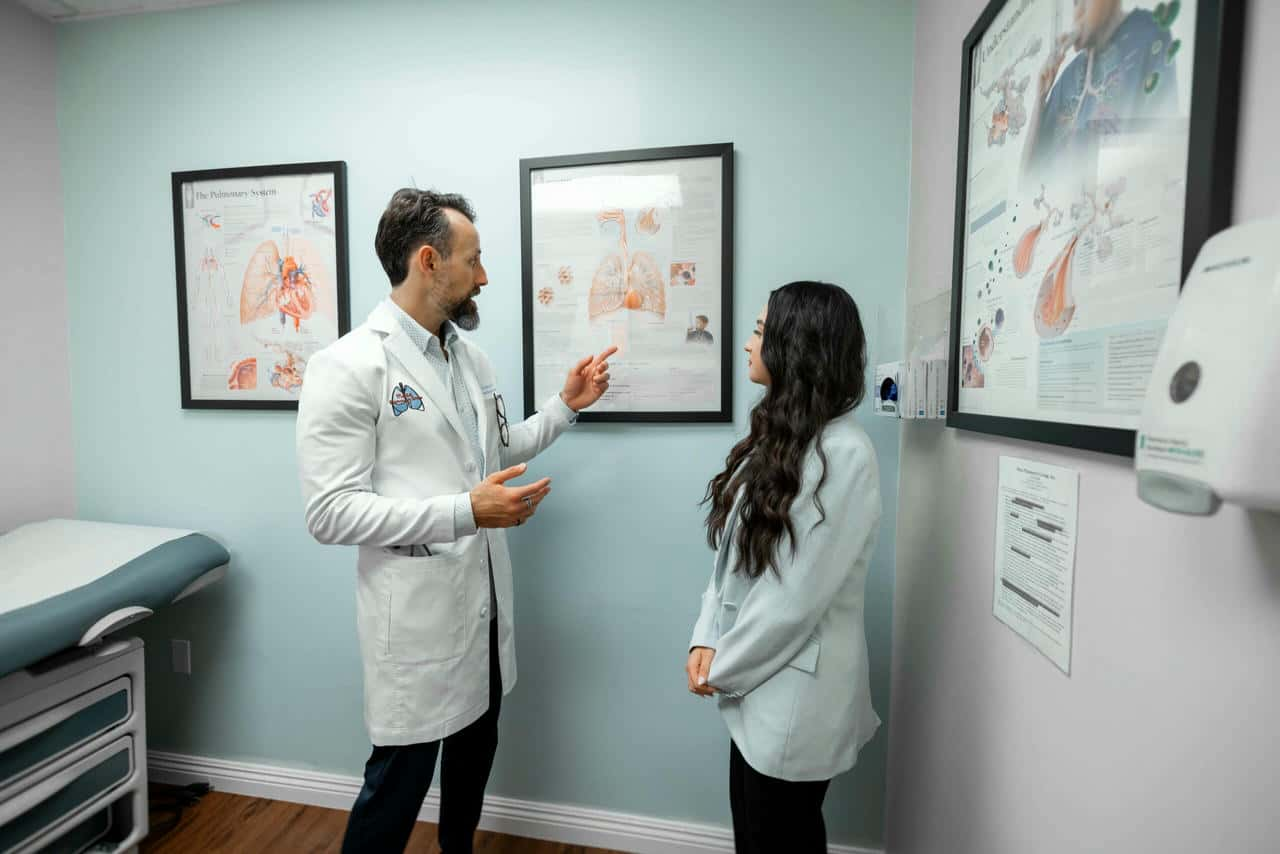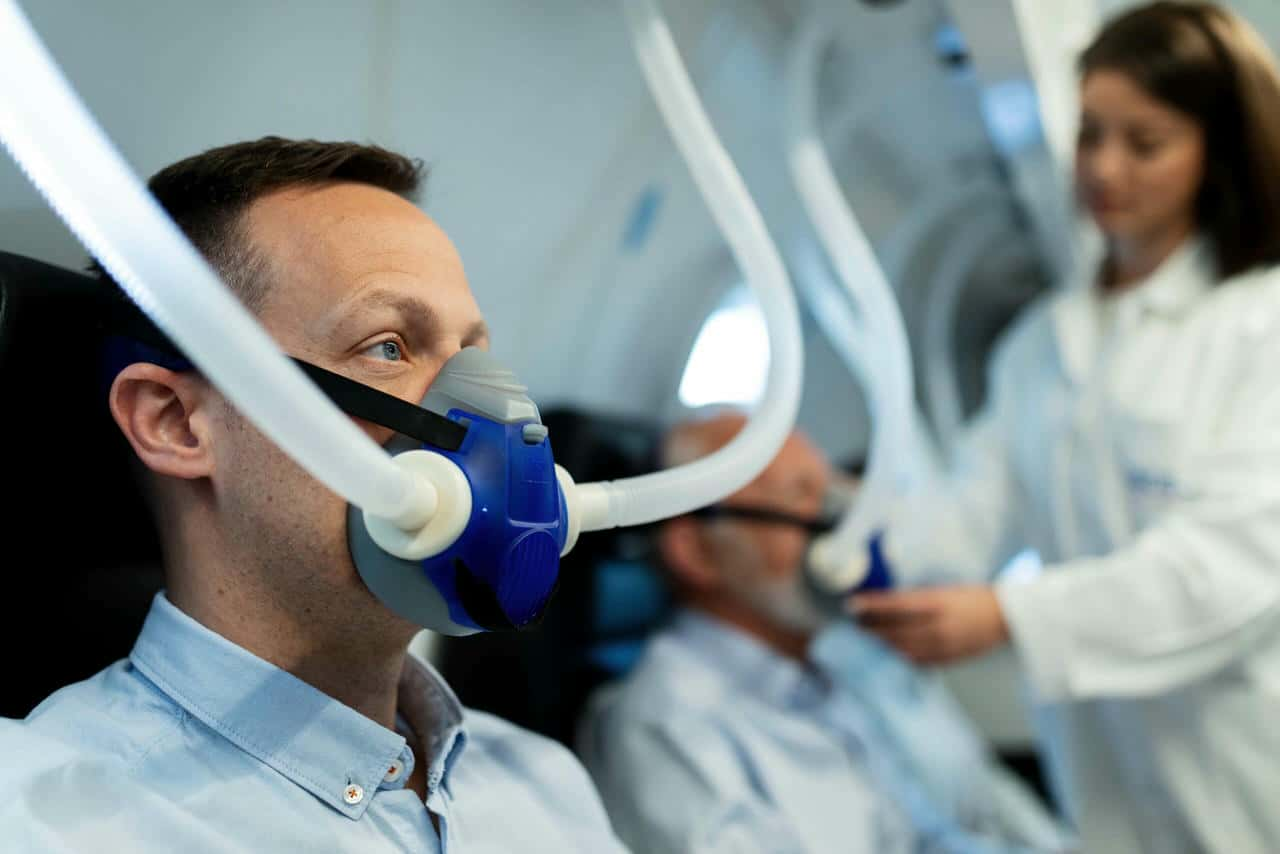
Breathing is something most of us take for granted, but for those suffering from Interstitial Lung Disease (ILD), every breath can become a struggle. ILD represents a group of more than 200 disorders that progressively scar the lung tissue, making it difficult to breathe and causing the body to be deprived of the oxygen it needs. This chronic condition can severely impact quality of life and, in some cases, become life-threatening.
At Newport Mesa Pulmonary, we specialize in diagnosing and managing ILD, using a personalized approach designed to slow disease progression and help our patients live as comfortably and actively as possible. With the right care, patients can manage symptoms, improve lung function, and enjoy a better quality of life. Here’s what you need to know about ILD and how our team can help.

What Is Interstitial Lung Disease?
Interstitial Lung Disease isn’t a single condition but a collective term for a group of lung diseases that cause inflammation and scarring, also known as fibrosis. This scarring occurs in the interstitium, the tissue surrounding the lung’s air sacs, blood vessels, and airways. Over time, the stiffening of the lung tissue restricts its ability to expand and contract properly, limiting oxygen flow to the bloodstream.
The progression of ILD varies from person to person. For some, the disease progresses slowly, while for others, it can worsen rapidly. Early detection and treatment are key to managing the disease effectively, which is why seeking expert care at Newport Mesa Pulmonary is so important.
Common Symptoms of Interstitial Lung Disease
The symptoms of ILD can develop gradually and worsen over time. Unfortunately, many patients mistake early symptoms for other less serious conditions, which can delay diagnosis and treatment. The most common symptoms include:
- Shortness of breath: Especially noticeable during physical activity and as the disease progresses, even at rest.
- Persistent dry cough: A cough that doesn’t go away and isn’t linked to a cold or infection.
- Fatigue: A constant feeling of tiredness and low energy, even after rest.
- Chest discomfort: A sense of tightness or discomfort in the chest area.
- Unexplained weight loss: Losing weight without making changes to diet or exercise.
Because these symptoms can resemble those of other respiratory conditions, a comprehensive evaluation by our experienced specialists is essential to an accurate diagnosis.
What Causes ILD?
The exact cause of ILD is often unknown (idiopathic), but it can be linked to certain factors, including:
- Autoimmune diseases like rheumatoid arthritis or lupus
- Long-term exposure to environmental toxins such as asbestos or silica
- Certain medications or radiation therapy
- Smoking
How Is ILD Diagnosed at Newport Mesa Pulmonary?
In many cases, the exact cause of ILD is unknown, which is referred to as idiopathic. However, there are several known risk factors and triggers that can lead to ILD, including:
- Autoimmune diseases: Conditions like rheumatoid arthritis, lupus, or scleroderma can cause inflammation that leads to lung scarring.
- Environmental toxins: Long-term exposure to harmful substances such as asbestos, silica, mold, or animal proteins can damage lung tissue.
- Certain medications or radiation therapy: Chemotherapy drugs or radiation treatments for cancer can sometimes result in lung scarring.
- Smoking: A major risk factor that can worsen the condition or trigger the onset of ILD in some individuals.
Knowing the root cause of ILD is important because it helps tailor the treatment plan to manage the condition more effectively.

Personalized Treatment Plans for ILD
While there is currently no cure for Interstitial Lung Disease, early intervention and proper management can significantly improve a patient’s quality of life and slow the progression of the disease. At Newport Mesa Pulmonary, we develop individualized treatment plans based on the latest clinical guidelines and each patient’s unique circumstances. Treatments may include:
- Medications: Corticosteroids or antifibrotic drugs are often used to reduce inflammation, slow scarring, and manage symptoms.
- Oxygen therapy: For patients whose blood oxygen levels are low, supplemental oxygen helps maintain oxygen levels and reduces shortness of breath.
- Pulmonary rehabilitation: A program that includes supervised exercise, breathing techniques, and education to improve lung function and overall fitness.
- Lung transplant: In severe cases, where other treatments have failed, a lung transplant may be an option. Our team can refer patients to the appropriate specialists for evaluation.
Our goal is to provide a treatment plan that not only addresses the physical aspects of ILD but also supports the patient’s emotional and mental well-being.
Lifestyle Changes to Improve Lung Health
In addition to medical treatments, certain lifestyle changes can help patients manage ILD more effectively and improve lung health. At Newport Mesa Pulmonary, we encourage patients to adopt habits that can slow the progression of the disease and enhance their quality of life, including:
- Avoiding lung irritants: It’s important to minimize exposure to smoke, dust, chemical fumes, and other environmental toxins that can worsen lung damage.
- Staying active: Regular physical activity, within limits, can improve lung capacity and help maintain overall health. Our pulmonary rehabilitation program provides a safe way to stay active under expert guidance.
- Eating a balanced diet: Proper nutrition supports the body’s ability to manage chronic illnesses and maintain strength. We can provide guidance on nutritional choices that complement your treatment.
Why Choose Newport Mesa Pulmonary for ILD Care?
Managing Interstitial Lung Disease is a lifelong journey that requires expert care and continuous support. At Newport Mesa Pulmonary, our multidisciplinary team is committed to providing comprehensive, patient-centered care from diagnosis through every stage of treatment. We stay at the forefront of ILD research and treatment, ensuring our patients benefit from the latest advancements in pulmonary care.
Our approach goes beyond just managing symptoms—we believe in empowering patients through education, compassion, and tailored treatment strategies. Whether it’s providing advanced diagnostics, personalized therapy, or emotional support, we are here to guide you every step of the way.
Take Charge of Your Lung Health Today
If you or a loved one is experiencing symptoms of Interstitial Lung Disease, early intervention can make all the difference. Don’t wait to seek the help you need. Book an appointment today with Newport Mesa Pulmonary, where our experienced team is ready to provide the expertise, care, and support you need to manage your condition and improve your quality of life.


